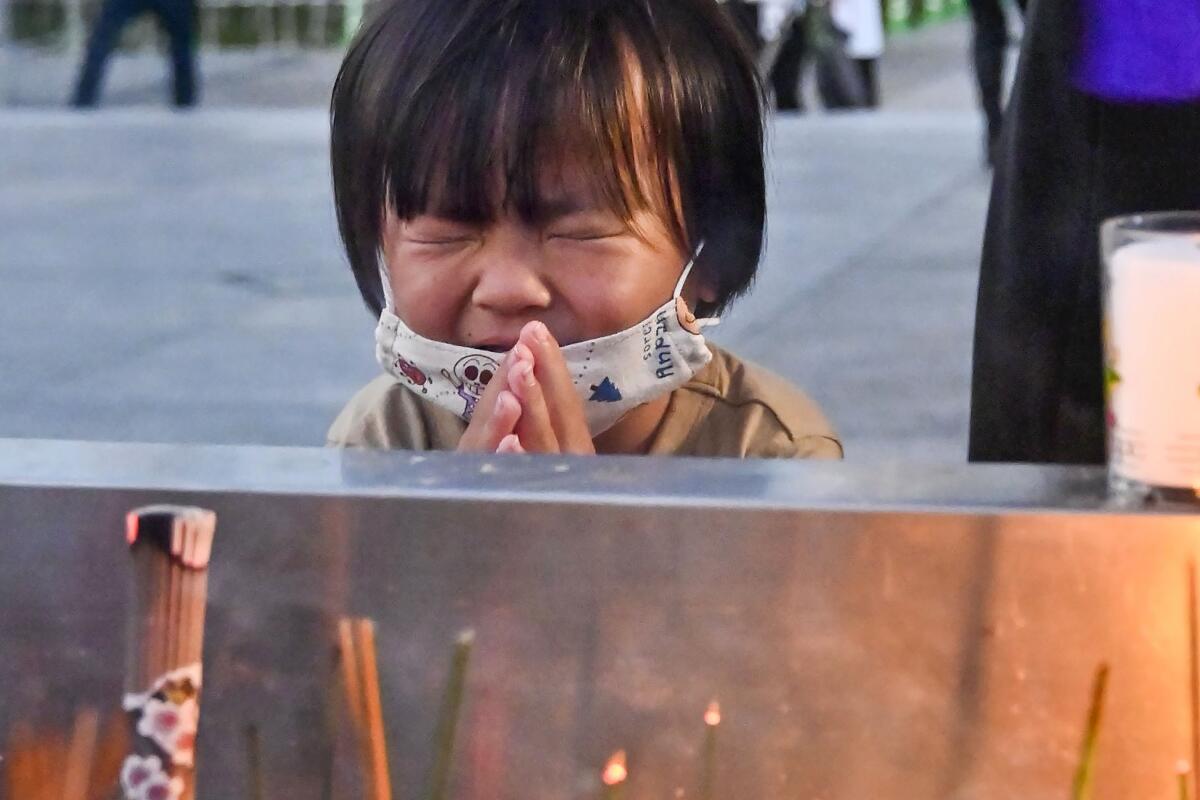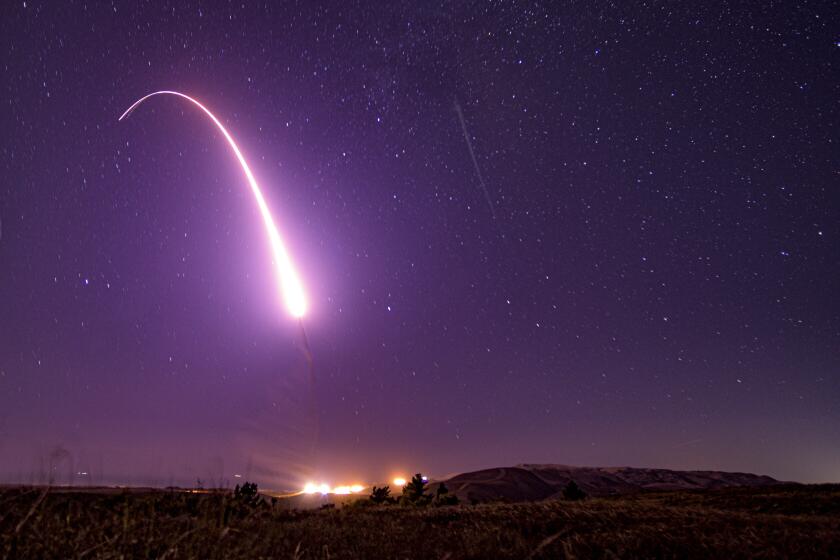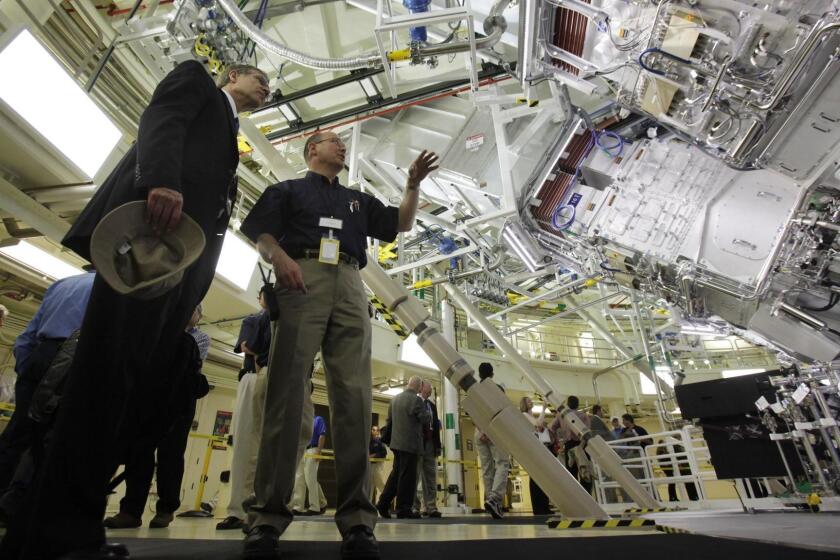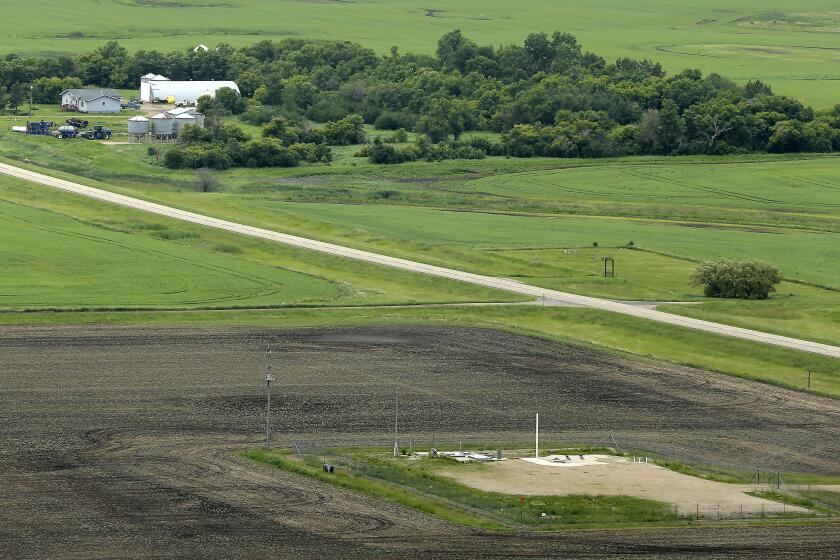Hiroshima remembers atomic bombing, warns of ‘threat of total annihilation’

- Share via
TOKYO — Hiroshima on Friday marked the 76th anniversary of the world’s first atomic bombing, as the mayor of the Japanese city urged global leaders to unite to eliminate nuclear weapons.
Mayor Kazumi Matsui urged world leaders to commit to nuclear disarmament as seriously as they are tackling a pandemic that the international community recognizes as a “threat to humanity.”
“Nuclear weapons, developed to win wars, are a threat of total annihilation that we can certainly end, if all nations work together,” Matsui said. “No sustainable society is possible with these weapons continually poised for indiscriminate slaughter.”
The United States dropped the world’s first atomic bomb on Hiroshima on Aug. 6, 1945, destroying the city and killing 140,000 people. It dropped a second bomb three days later on Nagasaki, killing 70,000 more. Japan surrendered Aug. 15, ending World War II and the nation’s nearly half-century of aggression in Asia.
Countries stockpiled nuclear weapons in the Cold War, and a standoff continues to this day.
The global Treaty on the Prohibition of Nuclear Weapons took effect in January after years of civil effort joined by the bombing survivors. But while more than 50 countries have ratified it, the treaty notably lacks the U.S. and other nuclear powers as well as Japan, which has relied on the U.S. nuclear umbrella for its defense since the war’s end.
Expansion could be scaled back as President-elect Joe Biden and Congress prioritize pandemic and recession problems.
Matsui renewed his demand that his own government “immediately” sign and ratify the treaty and join the discussion, to live up to the long-cherished wish of atomic bombing survivors, who are known as hibakusha. He also demanded that Japan provide productive mediation between nuclear and non-nuclear states.
Prime Minister Yoshihide Suga, who attended the ceremony in Hiroshima, did not mention the treaty and instead stressed the need for a more “realistic” approach to bridge the nuclear and non-nuclear weapons states and by strengthening the NPT. Later at a news conference, Suga said he had no plan to sign the treaty.
“The treaty lacks support not only from the nuclear-weapons states, including the United States, but also from many countries that do not possess nuclear arms,” Suga said. “What’s appropriate is to seek a passage to realistically promote nuclear disarmament.”
Suga also apologized for inadvertently skipping parts of his speech, including a pledge to pursue efforts toward achieving a nuclear-free world as head of the world’s only country to have suffered atomic attacks and to be fully aware of their cruelty.
A new nuclear arms race is underway, with California at the center, though it’s not clear its citizens realize it.
Many survivors of the bombings have lasting injuries and illnesses linked to the bombs and radiation exposure, and face discrimination in Japanese society.
The government began to medically support certified survivors in 1968 after more than 20 years of effort by the hibakusha.
As of March, 127,755 survivors, whose average age is now almost 84, are certified as hibakusha and eligible for government medical support, according to the health and welfare ministry.
Suga announced last month that the medical benefits would be extended to 84 Hiroshima survivors who had been denied aid because they were outside a government-set boundary. The victims were exposed to radioactive “black rain” that fell in the city after the bombing and fought a long legal battle for their health problems to be recognized.
Contributor: Missiles and warheads in holes in the ground are no way to deter nuclear war now
Keep warheads mobile, at sea or in the air, not in underground silos whose location hasn’t changed in decades.
Matsui urged Suga’s government to widen support to reach all those still suffering physical and emotional effects of radiation, including the black rain survivors who were not part of the lawsuit.
Thursday’s ceremony at the Hiroshima Peace Memorial Park was significantly scaled down because of the COVID-19 pandemic and was also eclipsed by the Olympics in Tokyo, where even national NHK television quickly switched to the Games after the main speeches.
More to Read
Sign up for Essential California
The most important California stories and recommendations in your inbox every morning.
You may occasionally receive promotional content from the Los Angeles Times.
















